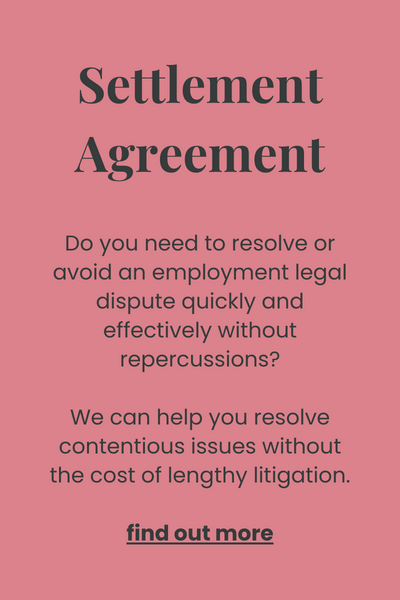4 Ways to Avoid Unfair Dismissal Claims

How can I avoid an unfair dismissal claim?
It’s important for employers to get it right when it comes to dismissing employees, particularly as unfair dismissals are one of the most common complaints to employment tribunals.
There are many steps, procedures, and appropriate guidance notes available with our HR service plans, designed to prevent employers and their businesses from being stung by an unfair dismissal claim.

Knowing how to successfully avoid unfair dismissals is an important skillset for every HR manager. Remember to follow ACAS procedures or it could cost you even more in court.
It’s easy to dismiss an employee fairly when you have commercial knowledge and support on your side. Our advice will help you navigate some of the complexities of employment law and ensure you stay compliant when considering how to dismiss your employees safely.
We have compiled a list of “4 top tips for employers” below, so you can begin the dismissal procedure legally, safely, and pragmatically.
1. Be aware that some reasons for dismissal are automatically unfair
There are some reasons for which employers are prohibited by law from dismissing an employee – these include dismissing an employee because they are pregnant, have ‘blown the whistle’ or asserted a statutory right.
If you dismiss an employee for a prohibited reason the dismissal will be automatically unfair.
Employees can bring automatically unfair dismissal claims from the first day of their employment. To avoid accidentally falling foul of the law it’s always important to seek advice on the facts of your case before taking any action.
2. Follow an appropriate procedure
Following an appropriate procedure is an important part of helping to achieve a fair dismissal.
Which procedure you need to follow will depend on what your reason is for wanting to take action – as you would expect the process for dealing with a disciplinary issue is very different to that for making redundancies.
For example, if you are dealing with a disciplinary matter it will be important to ensure you comply with the ACAS code of practice on disciplinary and grievances.
Even if you suspect an employee has committed an act of gross misconduct it is still important to follow a process if an employee has two years service or more.
If an employee has less than two years service, in some instances it may not be necessary to follow the usual procedures due to the rules on ordinary unfair dismissal.
However, it’s always important to seek expert advice to ensure there are no risk of claims in your particular case. You should contact Kingfisher Professional Services Ltd before taking action in relation to any employee, irrespective of their length of service.
Navigate the complexities of Employment Law with our commercial advice.Click HereBuild a bespoke interactive course for your management team, covering key HR areas.Click HereAvoid unnecessary wastage of management time with our professional help when defending tribunal claims.Click Here
Previous
Next
3. Ensure that any dismissal is fair and reasonable in the circumstances
If you have a potentially fair reason for dismissing an employee such as conduct, capability or redundancy it’s important to remember that you will also need to consider whether in light of the circumstances of the case it will be fair to dismiss.
For example when it comes to thinking about dismissing an employee for gross misconduct, you will need to have a genuine belief that the employee is ‘guilty’ of what they have been accused of, you will need to have reasonable grounds (evidence) for that belief and have carried out a reasonable investigation.
In addition, a dismissal would also need to be ‘within the band of reasonable responses’ – fair in the circumstances. This will involve taking into consideration matters such as any mitigation an employee puts forward, their length of service, whether they have a clean disciplinary record and how you have treated employees in similar cases in the past.
If you are considering dismissing an employee, you should contact Kingfisher Professional Services Ltd for advice on your situation.
Set your standards and expectations through tailored policies, recognising your business ethos.Click HereApproach poor performance with target driven processes to achieve a desirable outcome for your business.Click HereManage requests for reduced hours or hybrid working, in line with what works best for you.Click Here
Previous
Next
4. Be mindful of constructive dismissal
It’s important to remember that you need to act reasonably and fairly towards your employees as they may be able to complain to an employment tribunal if they feel they have been constructively dismissed.
In brief, constructive dismissal is where an employee resigns because they feel they are ‘forced’ to due to the way they have been treated. In such circumstances rather than the resignation being voluntary, the employee may complain to an employment tribunal that they have actually been constructively dismissed and that it was unfair.
Generally, to succeed in a constructive dismissal claim an employee needs to show that the employer has fundamentally breached the employment contract (such as a breach of mutual trust and confidence), or that they intend not to be bound by an essential term of the contract and because of this the employee has resigned and left at an appropriate time.
Do you think an unfair dismissal happened in your workplace?
If you you need more advice on how to avoid unfair dismissal claims, including cases of gross misconduct, or you’re worried about a case involving an unfair or wrongful dismissal, you can speak to our employment law team.


Bespoke Contracts of Employment for ultra protectionClick HereAbsence Management Support for sensitive situationsClick HereHas an employee’s recent behaviour warranted disciplinary action?Click Here
Previous
Next
Receive Legal Updates